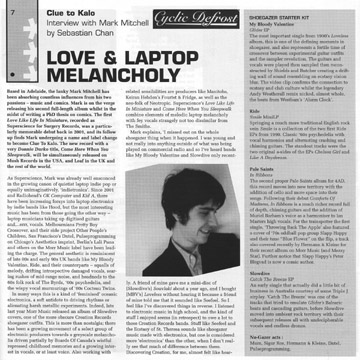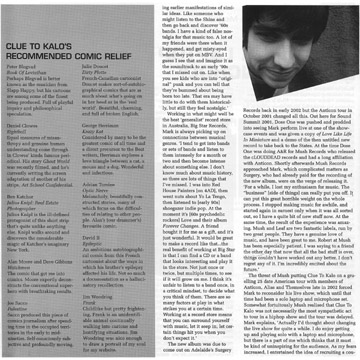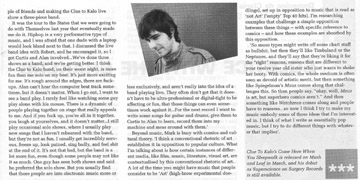
LOVE & LAPTOP MELANCHOLY
Based in Adelaide, the lanky Mark Mitchell has been absorbing countless influences from his two passions - music and comics. Mark is on the verge releasing his second full-length album whilst in the midst of writing a PhD thesis on comics. The first Love Like Life In Miniature, recorded as Superscience for Surgery Records, was a particularly memorable debut back in 2001, and its follow up finds Mark undergoing a name and label change to become Clue To Kalo. The new record with a very Donnie Darko title, Come Here When You Sleepwalk, will be simultaneously released on Mush Records in the USA, and Leaf in the UK and the rest of the world.
As Superscience, Mark was already well ensconced in the growing canon of quietist laptop indie pop or equally unimaginatively, 'indietronica'. Since 2001 and Radiohead's OK Computer and Kid A, there have been increasing forays into laptop electronics by indie bands like Hood, but the most interesting music has been from those going the other way - laptop musicians taking up digitised guitars andÉerrr, vocals. Melbournians Pretty Boy Crossover, and their side project Other People's Children, San Francisco's Dntel, Pulseprogramming on Chicago's Aesthetics imprint, Berlin's Lali Puna and others on the Morr Music label have been leading the charge. The general aesthetic is reminiscent of late 80s and early 90s UK bands like My Bloody Valentine, Ride, and their counterparts - squalls of melody, drifting introspective damaged vocals, searing rushes of mid-range noise, and headnods to the 60s folk rock of The Byrds, 60s psychedelia, and the wispy vocal murmurings of 80s Cocteau Twins.
In many ways this is a kind of 'feminised' oceanic electronica, a soft antidote to driving rhythms or alienating harsh metallic experiments. Indeed, late last year Morr Music released an album of Slowdive covers, one of the more obscure Creation Records shoegazer outfits. This is more than nostalgia; there has been a growing movement of a select group of electronic producers towards a greyscale melancholia driven partially by Boards Of Canada's wistful repressed childhood memories and a growing interest in vocals, or at least voice. Also working with related sensibilities are producers like Manitoba, Keiran Hebden's Fourtet & Fridge, as well as the neo-folk of Neotropic. Superscience's Love Like Life In Miniature and Come Here When You Sleepwalk combine elements of melodic laptop melancholy with fey vocals strangely not too dissimilar from The Smiths.
Mark explains, 'I missed out on the whole shoegazer thing when it happened. I was young and not really into anything outside of what was being played on commercial radio and so I've heard bands like My Bloody Valentine and Slowdive only recently. A friend of mine gave me a mini-disc of [Slowdive's] Souvlaki about a year ago, and I bought [MBV's] Loveless without hearing it because a friend of mine told me that it sounded like Seefeel. So I feel like I've discovered things in reverse. I listened to electronic music in high school, and the kind of stuff I enjoyed seems (in retrospect) to owe a lot to those Creation Records bands. Stuff like Seefeel and the Ecstasy of St. Theresa sounds like shoegazer music made with electronics, but one is considered more 'electronica' than the other, when I don't really see that much of difference between them. Discovering Creation, for me, almost felt like hearing earlier manifestations of similar ideas. Like someone who might listen to the Shins and then go back and discover '60s bands. I have a kind of false nostalgia for that music too. A lot of my friends were there when it happened, and get misty-eyed when they put on MBV. And I guess I see that and imagine it as the soundtrack to an early '90s that I missed out on. Like when you see kids who are into "original" punk and you can tell that they're bummed about being born too late. That era may have little to do with them historically, but still they feel nostalgic.'


Working in what might well be the best 'generalist' record store in Australia, Big Star Records, Mark is always picking up on connections between musical genres. 'I tend to get into bands or sets of bands and listen to them intensely for a month or two and then become intense about something else. I don't know much about music history, so there are lots of things that I've missed. I was into Red House Painters [on 4AD], then went nuts about Yo La Tengo, then listened to [early 90s] shoegazer indie pop. At the moment it's [60s psychedelic rockers] Love and their album Forever Changes. A friend bought it for me as a gift, and it's just wonderful. It would be great to make a record like that...the real benefit of working at Big Star is that I can find a CD or a band that looks interesting and play it in the store. Not just once or twice, but multiple times, to see if it will grow on me. I think it's unfair to listen to a band once, in a critical mindset, to decide what you think of them. There are so many factors at play in what strikes you at a certain time. Working at a record store means that you can surround yourself with music, let it seep in, let certain things hit you when you don't expect it.'
The new album was due to come out on Adelaide's Surgery Records back in early 2002 but the Anticon tour in October 2001 changed all this. Out here for Sound Summit 2001, Dose One was pushed and prodded into seeing Mark perform live at one of the showcase events and was given a copy of Love Like Life In Miniature and a demo of the then untitled new record to take back to the States. At the time Dose One was doing A&R for Mush Records who released the cLOUDDEAD records and had a long affiliation with Anticon. Shortly afterwards Mush Records approached Mark, which complicated matters as Surgery were on the verge of releasing it. 'For a while, I lost my enthusiasm for music. The "business" [side of things] can really put you off. It can put this great horrible weight on the whole process. I stopped making music for awhile, and started again in earnest only when it was all sorted out, so I have a quite bit of new stuff now. At the same time, the result of the experience was amazing. Mush and Leaf are two fantastic labels, run by two great people. They have a genuine love of music, and have been great to me. Robert at Mush has been especially patient. I was saying to a friend the other day that things couldn't have worked out any better. I don't regret any of it. I'm incredibly excited about the future.'
The threat of Mush putting Clue To Kalo on a gruelling 25 date American tour with members of Anticon, Alias and Themselves late in 2002 forced Mark to reconsider his live show, which until that time had been a solo laptop and microphone set. Somewhat fortuitously Mush realised that Clue To Kalo was not necessarily the most sympathetic act to tour in a hiphop show and the tour was delayed. Mark explains, 'Actually I'd thought about changing the live show for quite a while. I do enjoy getting up and playing solo with a laptop and microphone, but there is a part of me which thinks that it must be kind of uninspiring for the audience. As my fears increased, I entertained the idea of recruiting a couple of friends and making the Clue to Kalo live show a three-piece band.
It was the tour to the States that we were going to do with Themselves last year that eventually made me do it. Hiphop is a very performative type of music, and I was afraid that one dude with a laptop would look bland next to that. I discussed the live band idea with Robert, and he encouraged it, so I got Curtis and Alan involved...We've done three shows as a band, and we're getting better. I think the Clue to Kalo band, on their worst night, is more fun than me solo on my best. It's just more exciting for me. It's rough around the edges, there are fuck-ups, Alan can't hear the computer beat track sometimes, but it doesn't matter. When I go out, I want to see a band play. I rarely feel like watching some guy play alone with his mouse. There is a dynamic of people playing together on stage that really appeals to me. And if you fuck up, you're all in it together, you laugh at yourselves, and it doesn't matter...I still play occasional solo shows, where I usually play new songs that I haven't rehearsed with the band, but they're not as fun. I usually get incredibly nervous, freeze up, look pained, sing badly, and feel shit at the end of it. It's not that bad, but the band is a lot more fun, even though some people may not like it as much. One guy has seen both shows and said he preferred the solo show. But you usually find that those people are into electronic music more or less exclusively, and aren't really into the idea of a band playing live. They often don't get that it doesn't have to be ultra-professional or digital-tight to be affecting or fun, that those things can even sometimes work against it...For the next record I want to write some songs for guitar and drums, give them to Curtis to Alan to learn, record them into my machine and mess around with them.'
Beyond music, Mark is busy with comics and cultural theory. 'I think a conventional rhetoric of art establishes it in opposition to popular culture. What I'm talking about is how certain instances of different media, like film, music, literature, visual art, are contextualised by this conventional rhetoric of art. A lot of the time you might have music that people consider to be 'Art' (high-brow experimental doodlings), set up in opposition to music that is read as 'not Art' ('empty' Top 40 hits). I'm researching examples that challenge a simple opposition between these things - with specific reference to comics - and how these examples are absorbed by this opposition.
'So muso types might write off some chart stuff as bullshit, but then they'll like Timbaland or the Neptunes, and they'll say that they're liking it for the "right" reasons, reasons that are different to your twelve year old sister who just wants to shake her booty. With comics, the whole medium is often seen as devoid of artistic merit, but then something like Spiegelman's Maus comes along that challenges this. So then people say, "okay, well, Maus is art, but superhero comics aren't." And then something like Watchmen comes along and people have to reassess...so now I think I try to make my music embody some of these ideas that I'm interested in. I think of what I write as essentially pop music, but I try to do different things with whatever that implies'.
SEBASTIAN CHAN
Clue To Kalo's Recommended Comic Relief
Peter Blegvad, Book Of Leviathan: Perhaps Blegvad is better known as the musician from Slapp Happy, but his cartoons are among some of the finest being produced. Full of playful inquiry and philosophical speculation.
Daniel Clowes, Eightball: Equal measures of misanthropy and genuine human understanding come through in Clowes' kinda famous periodical. His story Ghost World was recently filmed, and he's currently writing the screen adaptation of another of his strips, Art School Confidential.
Ben Katchor, Julius Knipl: Real Estate Photographer: Julius Knipl is the ill-defined protagonist of this short strip that's quite unlike anything else. Knipl walks around and discovers the considerable magic of Katchor's imaginary New York.
Alan Moore and Dave Gibbons, Watchmen: The comic that got me into comics. Moore expertly deconstructs the conventional superhero with breathtaking results.
Joe Sacco, Palestine: Sacco produced this piece of comics journalism after spending time in the occupied territories in the early to mid-nineties. Self-consciously subjective and profoundly moving.
Julie Doucet, Dirty Plotte: French-Canadian cartoonist Doucet makes sort-of-autobiographical comics that are as much about what's going on in her head as in the "real world". Beautiful, charming, and full of broken English.
George Herriman, Krazy Kat: Considered by many to be the greatest comic of all time and a direct precursor to the Beat writers, Herriman explores a love triangle between a cat, a mouse and a dog. Wonderful and infectious.
Adrian Tomine, Optic Nerve: Melancholy, beautifully constructed stories, many of which focus on the difficulties of relating to other people. Alan's (our drummer's) favourite comic.
David B., Epileptic: An ambitious autobiographical comic from this French cartoonist about the ways in which his brother's epilepsy affected his life. Not so much a documentation as a hallucinatory recollection.
Jim Woodring, Frank: Childlike but pretty frightening, Frank is an unidentifiable animal continually walking into curious and horrifying situations. Jim Woodring was nice enough to draw a portrait of my soul for my website.
Shoegazer Starter Kit
My Bloody Valentine - Glider EP: The most important single from 1990's Loveless album, this is one of the defining moments in shoegazer, and also represents a fertile time of crossover between experimental guitar outfits and the sampler revolution. The guitars and vocals were played then sampled then reconstructed by Shields and Butcher creating a drifting wall of sound resembling an ecstasy vision blur. The video clip confirms the connection to ecstasy and club culture whilst the legendary Andy Weatherall remix nicked, almost whole, the beats from Westbam's "Alarm Clock".
Ride - Smile MiniLP: Springing a much more traditional English rock vein Smile is a collection of the two first Ride EPs from 1990. Classic 60s psychedelia with vocal harmonies and alternating crashing and chiming guitars. The standout tracks were the two original a-sides of the EPs Chelsea Girl and Like A Daydream.
Pale Saints - In Ribbons: The second proper Pale Saints album for 4AD, this record moves into new territory with the addition of cello and more space into their songs. Following their debut Comforts Of Madness, In Ribbons is a much richer record full of depth, chiming guitars and the addition of Muriel Barham's voice as a harmoniser to Ian Masters high vocals. For the trainspotter the first single, "Throwing Back The Apple" also featured a cover of 70s oddball pop group Slapp Happy and their tune "Blue Flower" on the flip, a track also covered recently by Hermann & Kleine for their recent album on Morr Music (and Mazzy Star). Further notice that Slapp Happy's Peter Blegvad is now a comic author.
Slowdive - Catch The Breeze EP: An early single that actually did a little bit of business in Australia courtesy of some Triple J airplay. "Catch The Breeze" was one of the tracks that tried to emulate Glider's Balearic beats and cascading guitars, before Slowdive moved into ambient rock territory with their subsequent releases all with undecipherable vocals and endless drones.
Nu-Gazer acts: Mum, Sigur Ros, Hermann & Kleine, Dntel, Pulseprogramming.